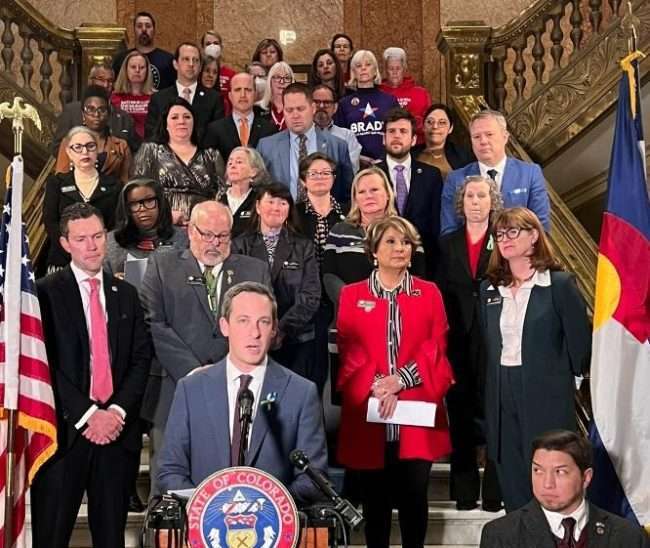
U.S. Senate
See Full Big Line
(D) J. Hickenlooper*
(R) Somebody
80%
20%

Governor
See Full Big Line
(D) Joe Neguse
(D) Phil Weiser
(D) Jena Griswold
60%
60%
40%↓

Att. General
See Full Big Line
(D) M. Dougherty
(D) Alexis King
(D) Brian Mason
40%
40%
30%

Sec. of State
See Full Big Line
(D) George Stern
(D) A. Gonzalez
(R) Sheri Davis
40%
40%
30%

State Treasurer
See Full Big Line
(D) Brianna Titone
(R) Kevin Grantham
(D) Jerry DiTullio
60%
30%
20%

CO-01 (Denver)
See Full Big Line
(D) Diana DeGette*
(R) Somebody
90%
2%

CO-02 (Boulder-ish)
See Full Big Line
(D) Joe Neguse*
(R) Somebody
90%
2%

CO-03 (West & Southern CO)
See Full Big Line
(R) Jeff Hurd*
(D) Somebody
80%
40%

CO-04 (Northeast-ish Colorado)
See Full Big Line
(R) Lauren Boebert*
(D) Somebody
90%
10%

CO-05 (Colorado Springs)
See Full Big Line
(R) Jeff Crank*
(D) Somebody
80%
20%

CO-06 (Aurora)
See Full Big Line
(D) Jason Crow*
(R) Somebody
90%
10%

CO-07 (Jefferson County)
See Full Big Line
(D) B. Pettersen*
(R) Somebody
90%
10%

CO-08 (Northern Colo.)
See Full Big Line
(R) Gabe Evans*
(D) Yadira Caraveo
(D) Joe Salazar
50%
40%
40%

State Senate Majority
See Full Big Line
DEMOCRATS
REPUBLICANS
80%
20%

State House Majority
See Full Big Line
DEMOCRATS
REPUBLICANS
95%
5%
 February 27, 2023 12:47 PM UTC
February 27, 2023 12:47 PM UTC 5 Comments
5 Comments
I absolutely agree with Sen. Sullivan that a national ban is needed. But that’s not going to happen in the foreseeable future.
However, a statewide ban would give local law enforcement the tool they need to remove assault weapons from public use as they come across them and not have to wait until there is a pile of bodies before they can act.
Chances of passing an “assault weapon” ban seem iffy, and chances of having it upheld in the courts at the current time and with the current views of the Supreme Court’s functional majority are remote, at best.
Seems to me that setting criteria for licensing weapons and ammunition sales is more plausible. We allow people to operate different sorts of vehicles with different levels of licensure and insurance. Colorado takes different approaches to bicycles, motorcycles, personal cars and trucks, racing cars and “heavy” trucks. We ought to be able to have variations in access and use of different sorts of weapons.
Link it to levels of potential harm. Colorado could have a debate on what is appropriate based on projectile speed & weight within varying amounts of time. Single shot 22-caliber rifles for target shooting and basic training are vastly different than single-shot 50-caliber sniper rifles. Weapons firing multiple rounds at high speed are very different than a double-barreled shotgun. Hollow-point rounds obviously vary from solid rounds.
Requiring instruction on legal expectations about use and misuse, a demonstration of skills, and proof of whatever might be “adequate insurance” seems to me a reasonable approach to maintaining Second Amendment access to weapons and increasing safety.
I'm a big fan of treating guns like we treat cars. Let's have county registrations for guns that pay for county gun ranges and safety classes. Let's require registration for semi-automatic guns the same way we require registrations for cars. Have your gun but don't have it registered? Law enforcement can impound it and you can get it back once you have proper registration! Don't want to keep your gun registered? Then you must not be a responsible gun owner!
We're currently on the hot rails to "There's no such thing as constitutional firearm regulation," so this won't matter much unless/until a significant number of elected officials adopt a "John Marshall has made his decision; now let him enforce it" attitude toward the federal judiciary and constitutional adjudication.
Sadly true. The GOP is more the party of Andrew Jackson than Lincoln these days